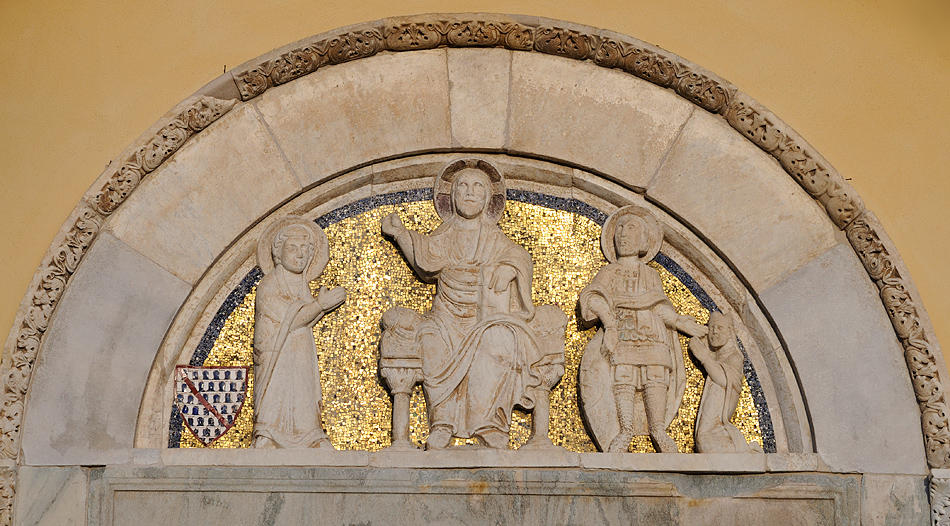Try Amazon Fresh

Try Amazon Audible Premium Plus and Get Up to Two Free Audiobooks
Il bassorilievo nella lunetta del portale di ingresso della chiesa di Santa Sofia a Benevento, Italia
Bas Relief in the lunette of the portal of the Church of Saint Sofia in Benevento, Italy

A larger detail of Saint George on the lunette of the portal of the Church of Saint Sofia in Benevento, Italy
The Church of Santa Sofia was completed by Arechi II in the year 762 and represents one of the most important architectural testimonies of Longobardia Minor.
...
The façade was enriched in the sixteenth century with curved slopes. Very beautiful is the Romanesque portal, in whose lunette there is a bas relief of the 13th century. The portal is included in a large cavity that also resembles a portal, flanked by two columns that support another arch.
The church was almost completely destroyed by the earthquake of 5 June 1688 and rebuilt in Baroque style at the behest of Cardinal Orsini (future Pope Benedict XIII). During the renovation, commissioned to engineer Carlo Buratti in 1705, the plan was transformed from stellar to circular, two side chapels were added and the appearance of the apses, façade and pillars was renewed.
Chiesa di Santa Sofia, Comune Benevento
The lunette is occupied by a relief with a blessing Christ flanked by the Madonna and by a warrior saint who presents an ecclesiastic, probably the bishop or abbot who was responsible for the western extension of the church which was destroyed by an earthquake in the 17th century.
Santa Sofia a Benevento, Italia nell'Arte Medievale
Saint George is referenced as fig. 47 in "The Monreale Capitals And The Military Equipment Of Later Norman Sicily" by David Nicolle
47. "St. George", statue, late 12th century, south Italian (Portal of S. Sofia, Benevento).
p.95: Such pre-Norman mail was again short-sleeved and ended above the knees as seen at Monreale (Figs. 20, 47, 49 and Foto I).
p.96: Whereas the mailed warriors of Monreale mostly demonstrate clear western European influence, those warriors wearing scale armour
(Figs. 18 and 20-24) seem at first glance to derive from Byzantine prototypes, as might other such examples in southern Italy (Figs. 46 and 47).
Saint George is referenced on p.257, Arms and Armour of the Crusading Era, 1050-1350, Western Europe and the Crusader States by David Nicolle, 1999.
682 ‘St George’, carving, Campania, late 12th/early 13th centuries
(in situ Cathedral, Benevento, Italy)
Many southern Italian representations of warrior-saints draw upon Byzantine iconography.
This is usually apparent in their stylised lamellar or scale cuirasses which are unlikely to reflect reality.
Beneath the cuirass this saint wears a mail hauberk and mail chausses, though different conventions are used to indicate these two pieces of armour.
For terms in italics see Terminology in Armour of the Crusading Era, 1050-1350 - Western Europe and the Crusader States by David Nicolle
Other Illustrations from Muslim Influenced, Norman and Lombard Southern Italy and Sicily
13th Century Illustrations of Costume and Soldiers
Italian Illustrations of Costume and Soldiers

